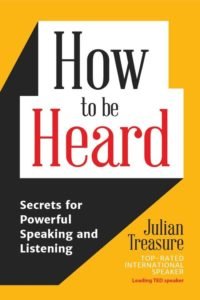In his 2013 TED Talk, sound consultant Julian Treasure speaks about the power of speaking. His talk is a treasure of handy how-to tips on getting people to listen to you and some vocal exercises you could do before a public speaking event. He also discussed the 7 Sins of Speaking; common habits you should try to avoid when engaging in conversations.
Gossiping
Spreading bad stories about others that are not present. Gossiping has many motivations; it may be to feel better about your own mistakes, harm the image of people you look up to or you simply can’t bury the excitement that comes with a juicy story.
You might not be aware of your little tittle-tattles, but the one you are chatting with usually does. He or she will start thinking: “What keeps that gossiper from talking about me in the same way, when surrounded by other people?”
Judging
Gossiping usually goes hand in hand with being judgmental. We all know a person who is always quick to point out the faults in others. You can feel vulnerable when talking to someone like that, which undermines the fundamentals of open discussions.
The line between observations and judgments can be thin, and they might be interpreted differently. Sometimes it would be better to wait until you know more about a person or situation.
Excuses
When someone calls you out for doing something wrong, it is easy to quickly respond with a “Yeah, but I…”. Coming up with excuses for everything you do, is a defense mechanism. Sometimes it even becomes offensive, if you shift the blame for your actions and words towards others.
As Julian Treasure perfectly illustrated, some people seem to walk around with a blamethrower. This weapon may not be as life-threatening as a real gun, but it is just as deadly to conversation.
Lying (exaggeration)
Of course it is perfectly fine to use a hyperbole or two to make your story more compelling or funny. But nobody don’t want to listen to constant exaggerations. People will start to question everything you say.
Stretch the truth too far and you will no longer be able to cover your lies.
“hahaha ROFL”
– “No you’re not. I can see you.”
Dogmatism
Ah, my favorite. Dogmatism is when someone states their opinion as a fact, and refuses to consider anyone else’s opinion. You are not always right and nobody is always wrong. Some people become more dogmatic on the urge of losing an argument, or simply can’t bear to be told anything that might affect their reality.
I feel like this is particularly common in comment sections on the internet and political discussions. It has a sense of self-righteousness and arrogance to it, which is infuriating during conversations. It is as if you’re talking to a brick wall – only that wall is decorated with selfies, mirrors and quotes that person wrote him/herself.
Complaining
A form of negativity, only coming up with subjects to be able to complain about them. I noticed this happens a lot during small talk.
“The weather is shit, politicians are shit, the whole system is shit.” So much shit, it seems they a shit ton to shit on. Cut your shit and get your shit together, because nobody gives a shit about your shit list, shithead.
(sometimes you got to adapt your lexicon to get your message across)
Negativity
It’s not fun to talk with someone who is a misery guts and tries to squash your good mood with every syllable. If you are unhappy with your current life, you can easily let this slip through in your word usage and conversation subjects. There are plenty of topics that do not interfere with your pessimism.
“The optimist proclaims that we live in the best of all possible worlds… and the pessimist fears this is true.”
7 Tips to Never Be Boring In Conversations Again
by FreshSaga
How To Tell Stories That Keep People Listening
by FreshSaga
Gary Provost wrote an excellent example of what pacing does to your stories. Mixing up the length of your sentences is an excellent way to keep people listening. Instead of being a boring narrator, it will be like you are singing your story with an unique melody. Turn your words into music and people will listen breathlessly and hang on your every word.

How To Be Heard
by Julian Treasure
Julian Treasure also wrote a book on effective speaking, listening, and understanding skills. How to be Heard includes exercises to develop your communication skills that are as effective at home as in the boardroom or conference call. Julian Treasure offers an inspiring vision for a world of effective speaking, listening and understanding.
Secrets of communication skills and tips discussed in How to be Heard include:
- How to make sound work for you
- Why listening matters
- The four cornerstones of powerful speaking and listening
- How to avoid the seven deadly sins of speaking and listening
- How to listen and why we don’t
- The power of your vocal toolbox and tricks of great speakers
- Exercises and methods to achieve clarity, precision and impact
- How to deliver a great talk.






1 Comment